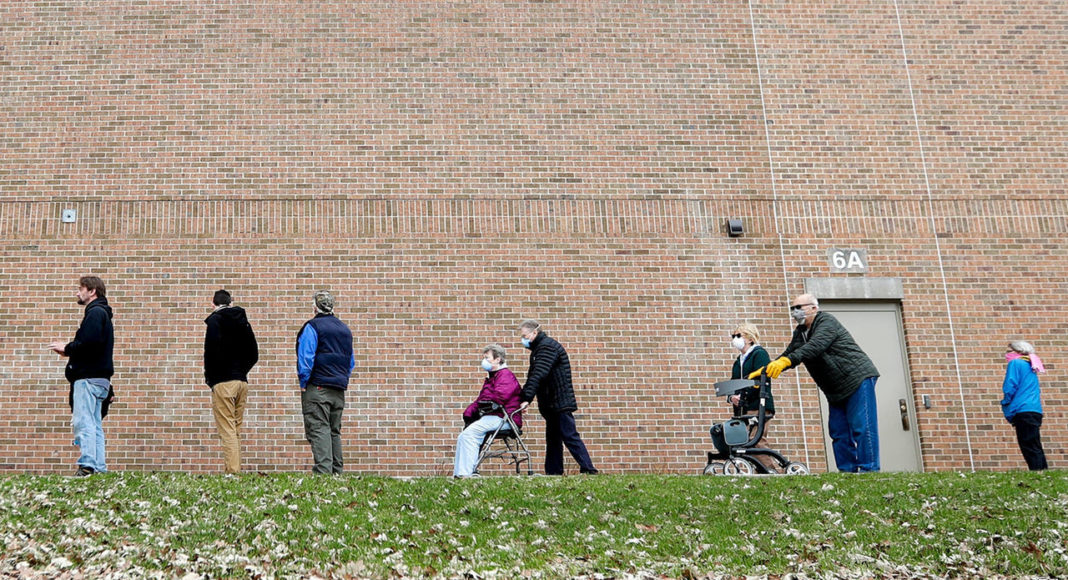Apr 28th 2020
Editor’s note: The Economist is making some of its most important coverage of the co-19 pandemic freely available to readers of The Economist Today, our daily newsletter. To receive it, register here. For our coronavirus tracker and more coverage, see our hub
ON MAY 3RD, months after Bolivia’s former president Evo Morales was forced to resign, the country was supposed to elect his successor. Because of co-19, that election has been postponed. Bolivians are now stuck with a caretaker president who seems in no mood to relinquish power. They are not alone. The pandemic is playing havoc with elections worldwide. Britain, France, North Macedonia and Serbia have already postponed ballots of various sorts. Opposition politicians in Poland have called for the presidential contest in May to be delayed; some have called for a boycott if it takes place. Eighteen American states have postponed or cancelled presidential primaries, including New York, which scrapped its primary on April 27th. At this rate, scores of elections may be derailed or disrupted, perhaps even America’s polls in November.
In some quarters, this has revived the debate about internet voting. A recent poll revealed that 56% of people in France would have welcomed a chance to vote by computer or smartphone. A Polish senator has launched a petition to introduce the technology in time for the presidential election. In America, a few states have experimented with web-based voting portals. In Britain, the main opposition Labour Party this month elected a new leader in an online ballot in which 70% of its 550,000 members voted.
Electing presidents between Zoom calls and episodes of “Tiger King” certainly has its appeal. Studies show online voting could be half as expensive as the normal kind and far cheaper than the main alternative, voting by post. Disabled, elderly and overseas voters could certainly benefit, as could any country facing a prolonged lockdown.
Yet online voting faces serious, possibly insurmountable obstacles. Even its keenest cheerleaders acknowledge that it should complement, not replace, other methods. The consensus among experts is that the technology remains vulnerable to security breaches and cyber-attacks. Malware can tamper with votes before they reach government servers. Hackers can create mirror versions of an election portal, steal voter credentials, or attack computers that count and store online ballots. A recent paper by the International Foundation for Electoral Systems, a non-profit group, concludes that countries without experience of online voting should not contemplate rolling it out in response to the co-19 crisis. The cure would be worse than the disease.
Even if online voting were foolproof voters might not embrace it for years, if ever. Data security and encryption are complex. Conventional voting methods are also subject to fraud and error, but falsifying millions of paper ballots is a weighty undertaking. In contrast, electronic data are weightless, and a single flaw can in theory be exploited at large scale by anyone who finds it.
Electronic voting allows for even less room for error than other online activity like, say, banking. For banks and their customers, the convenience of transacting online makes the risks of hacking or phishing attacks easier to tolerate. Banks can endure the occasional security breach. Democracies cannot accept any doubt about the outcome of an election. Clients whose funds have been pilfered can detect fraud by browsing their bank statements, and claim compensation. But there are no agreed-upon auditing measures for voting online. Any suspicion that an outside power has tampered with votes cast online can destroy confidence in the whole electoral process.
Even in Estonia, the only country to use online voting nationwide, it took several election cycles to develop trust, says Robert Krimmer, a professor of e-governance at Tallinn University. In 2005, when the country introduced the technology, just 2% of voters filled out their ballots online. In the general elections of 2019, the share reached 44%. Estonia’s system did not emerge in a vacuum. In two decades, the country has managed to digitise its entire bureaucracy. Today, practically the only things Estonians cannot do online is get married or divorced, or transfer property.
Even Estonian officials admit no system, including theirs, can be fully immune from cyber-attacks. Estonia has reduced some of the risks, including voter coercion, by allowing people to check and change their votes before they are recorded. A state-issued electronic ID and smartcard, which Estonians use for a range of services, from paying taxes to accessing health records, ensures voter authentication. “Because of the pathological fear of government intrusion,” says Jeremy Epstein of the Association for Computing Machinery, “this would never fly in the US.”
The past year has not been kind to internet voting. Lithuania shelved the technology, citing the threat of election interference by Russia. Swiss lawmakers voted to end trials after analysts uncovered flaws in a government-designed system. In America, Democrats made a hash of the Iowa caucuses when an app designed to record votes crashed, delaying results. West Virginia ditched online voting after a study by the Massachusetts Institute of Technology showed the app it was planning to use was riddled with security holes.
For now, the only safe, viable alternative to voting in person is voting by post, though this too faces serious legal and logistical hurdles. Online voting is not ready for the world’s democracies to deploy during the co-19 pandemic. Perhaps they will be better prepared for the next one.■
Dig deeper:For our latest coverage of the co-19 pandemic, register for The Economist Today, our daily newsletter, or visit our coronavirus tracker and story hub



